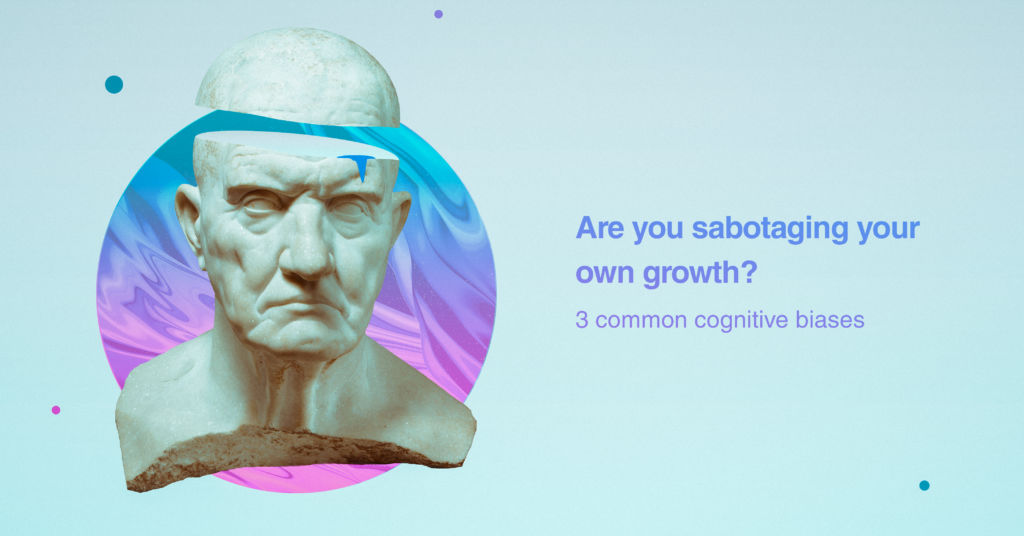3 common cognitive biases
Cognitive and emotional biases are problems in our information processing. Even though we think that we can handle information objectively, most of the time we don’t: due to our feelings, wishes and sub-consciousness.
Biases shape the way we think and can often lead us to irrational decision-making. For marketers and managers they can form a hidden path to attract and convert customers. But it shouldn’t surprise you that this is not a one-way road.
If you are able to use your clients’ “irrationality” for your benefit, then these biases can provoke the exact opposite. However, for this article we’re trying to answer the question: Are you standing in your own way and hindering the growth of your business unknowingly?
There are numerous types of biases, and every one of us is affected by them to a certain degree. Below we will list three biases that potentially influence your quality of work in an inconspicuous way. The good news is, knowing about them and doing some self-diagnostic can improve the situation immediately!
1. Confirmation Bias
Confirmation bias is a well-documented phenomenon. You could define it as a tendency to search for information, then favour and interpret it in a way that reassures existing beliefs without considering alternative ideas.
For example: If you are a supporter of Donald Trump you are probably going to read articles and books that are positively related to Donald Trump. As a Trump opponent negative headlines will catch your attention way faster. In principle, you start with an already strong assumption and only consume facts that fortify it.
You fall for confirmation bias whenever you actively put a lot of energy into looking for evidence to prove your point and ignore everything that speaks against your opinion. This can get worse if you operate in an “echo-chamber”, where you usually don’t come across different-minded people and only surround yourself with beliefs that coincide with your own.
Concerning your business, this can entrap you to handle data erroneously, when you wanted or expected a certain outcome in advance. A common approach, for example, is to stop a running test early, only because it brought the results you wanted to see. Although the data seems to be in your favour in this case, the test might have taken a turn and brought you different or new details afterwards.
It is often easy to find what one was already looking for, so always be sure that you are searching with an objective intention.
2. Status-Quo Bias
“To do nothing is in every man’s power.” – Samuel Johnson
Sticking to decisions that were made previously is an admittedly simplistic roundup of the status-quo bias. We all heard statements like ‘it always worked that way’ before and likely use them too sometimes. Sticking to choices that worked in the past is often the EASIER and SAFER call, which doesn’t necessarily means that it is the BEST decision to make.
Especially in today’s fast-paced world, innovation and change are indispensable. If you want improvement you have to keep questioning your methods and valuations continuously. The status-quo bias often gets combined and reinforced by loss-aversion (it is better not to lose 10$ than find 10$) and the endowment effect (you value things higher merely because you own them). All those factors make it harder to go for the riskier but better alternative, once it shows up.
An easy approach to avoid this, for example, could be independent and external feedback before making existential decisions.
3. Illusory Superiority Bias
The illusory superiority bias gets described as an overestimation of your own qualities and skills in comparison to the same qualities and skills of other people. It is the illusion that you stand head and shoulders above others and are more competent to carry out a task, although that might not be true. This brings the risk of drawing false conclusions and making bad choices for you and your business.
In 1999 a very similar and related psychological occurrence (Dunning-Kruger Effect) was identified in a study by David Dunning and Justin Kruger. They tested students in different categories (grammar, logic, etc.) and later asked them how well they think they did on the tests. Surprisingly students that scored the lowest overestimated their results the most. Furthermore, they were unable to correctly assess the competence levels of comrades, and therefore rank the quality of their own work too high.
This boost in ill-founded confidence can be found everywhere and is a stumbling block that you definitely have to look out for in your everyday life and working space. Not only concerning yourself but also the partners and experts you choose to work with.
The diagram of the Dunning-Kruger Effect is a great visualization and intelligible summary:
Conclusion
Biases sneak in unnoticed. No matter how logical and self-reflecting we are, our brain will always try to take an easy shortcut, hence leave us vulnerable.
Being aware and honest about this situation will help you to overcome possible negative consequences and make your decisions a little more objective overall.
Shift the focus inwards every so often and always try to base your next step on valued knowledge rather than assumptions and beliefs.
To learn more about this subject, feel free to have a look at this book by Dan Ariely: Predictably Irrational: The hidden forces that shape our decisions.
This article was written by our collaborator Sacha Schmitz.

